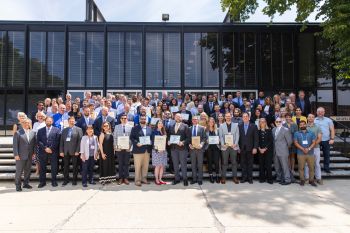IIT Announces New President
Dr. John L. Anderson, Provost of Case Western Reserve University, to Head Chicago Institution
The Board of Trustees of Illinois Institute of Technology (IIT), chaired by John W. Rowe, president and CEO of Exelon Corporation, is pleased to announce that Dr. John L. Anderson, currently provost of Case Western Reserve University, will be the eighth president of IIT.
Anderson will assume his duties on August 1, 2007.
A Wilmington, Delaware native, Anderson has served as provost of Case Western Reserve University in Ohio since 2004. Prior to Case, he served for 28 years at Carnegie Mellon University in Pennsylvania, including eight years as dean of the College of Engineering. In addition, Anderson chaired the Carnegie Mellon Department of Chemical Engineering and served as director of its Biomedical Engineering program. Anderson belongs to the National Academy of Engineering and is a fellow of the American Academy of Arts and Sciences.
Anderson received his bachelor's of chemical engineering degree from the University of Delaware and his master's and Ph.D. in chemical engineering from the University of Illinois at Urbana-Champaign. He served on the faculty of Cornell University in New York for five years before joining the faculty at Carnegie Mellon.
The 16-member Presidential Search Committee, chaired by John Rowe, consisted of IIT trustees, faculty, staff, and students, as well as a community representative. The committee conducted a national, nine-month search, resulting in 10 final candidates, each with a high caliber of distinction in the higher education community.
"In his interviews, Dr. Anderson was outstanding in his commitment to strengthening the engineering and hard science programs that constitute the historic core of IIT," Rowe said. "His focus upon increasing cooperation among all IIT colleges, his willingness to combine vision and personal attention in fundraising, and his thinking about ways to leverage the university's position in the City of Chicago will help lead IIT to the next level.
"The Board of Trustees and I would like to thank our current President Lew Collens for his indelible imprint upon IIT," Rowe added. "Lew has fundamentally transformed the university and has laid the foundation to position IIT as a national leader in technology and entrepreneurship."
Anderson's accomplishments include increasing the number of endowed chairs in engineering at Carnegie Mellon from five to 29 and substantially improving the diversity of that college with respect to both women and minorities, and founding the Institute for Complex Engineered Systems. While he was dean, Carnegie Mellon was consistently ranked among the Top 10 engineering colleges in the United States. At Case Western Reserve University he led initiatives that resulted in a 25 percent increase in undergraduate enrollment while sustaining the high academic profile of the students. He also started a university-wide Office of Undergraduate Research, added resources to the university's Division III athletic program (two conference championships this year), instituted a funded partner-hiring program for faculty recruitment, and promoted industrial partnerships through the Office of Research and Technology Management.
Anderson has held visiting professorships at MIT, the University of Melbourne (Australia), and the Landbouwuniversiteit Wageningen (The Netherlands), and has presented guest lectures at many other universities, including the Berkeley Lectures at the University of California, the Lacey Lectures at Caltech, the Holtz Lecture at Johns Hopkins, the Dodge Lecture at Yale, the Quinn Lecture at the University of Pennsylvania, and the Katz Lecture at City College NY. He also has been awarded a Guggenheim Fellowship.
He has served as member and co-chair of the Board of Chemical Sciences and Technology at the National Research Council (1996-2001). He co-chaired the NRC-sponsored workshop on Challenges for the Chemical Sciences in the 21st Century: National Security and Homeland Defense (2002), and he chaired the NRC study, Existing and Potential Standoff Explosives Detection Techniques (2004). He is the author of more than 100 journal articles and book chapters.
Anderson's research interests include electrokinetic phenomena, electrophoresis of complex particles, transport in porous media and gels, membrane separations, fluid dynamics at low Reynolds numbers, and bioengineering. He has raised millions of dollars from the National Science Foundation, National Institutes of Health, and other major funding organizations.
Anderson, and his wife, Pat, have two children and two grandchildren.
Founded in 1890, IIT is a Ph.D.-granting university with more than 6,700 students in engineering, sciences, architecture, psychology, design, humanities, business and law. IIT's interprofessional, technology-focused curriculum is designed to advance knowledge through research and scholarship, to cultivate invention improving the human condition, and to prepare students from throughout the world for a life of professional achievement, service to society, and individual fulfillment.




